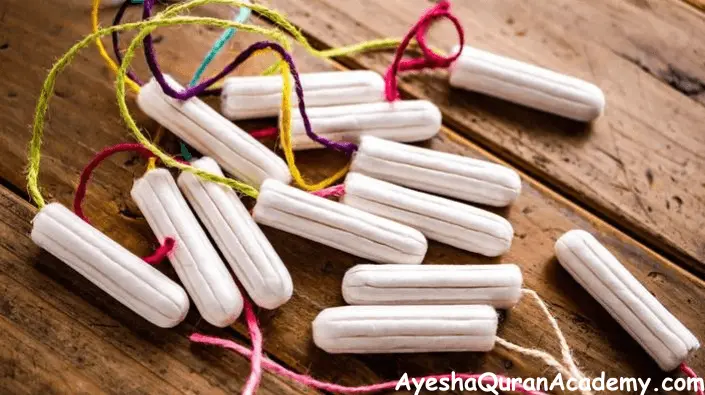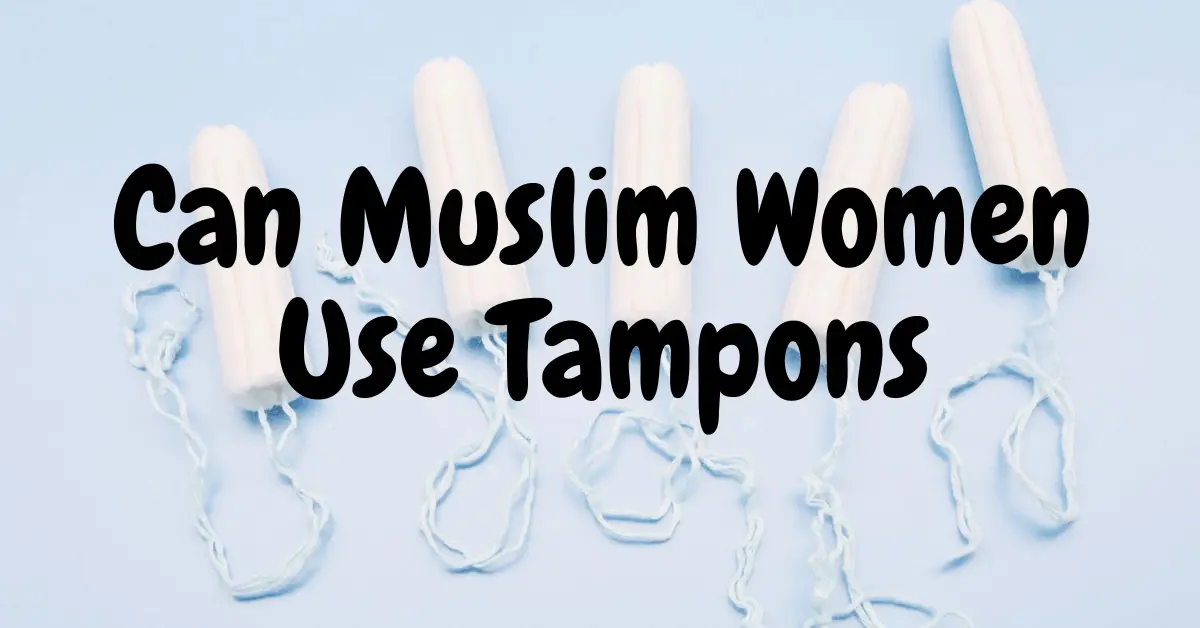In today’s diverse world, where cultures and faiths intertwine, it’s essential to address questions that arise at the crossroads of religion and everyday life.
One such question that has gained attention is whether tampons are considered haram (forbidden) in Islam.
What Are Tampons?
Tampons are a type of menstrual hygiene product designed to absorb menstrual fluid during a woman’s period. They are typically made of soft and absorbent materials, such as cotton, rayon, or a blend of fibers. Tampons come in various sizes and levels of absorbency to accommodate different flow levels throughout the menstrual cycle.
Tampons are typically designed in a cylindrical shape, and they often include an applicator to facilitate insertion. This applicator can be constructed from either plastic or cardboard, and it assists in the comfortable and hygienic placement of the tampon into the vaginal canal.
Some tampons are available without applicators, relying on the user’s comfort and familiarity with the insertion process.
Are Tampons Haram or Halal in Islam?
No, Tampons are not Haram. It is better for Muslim women to use it after getting married. The permissibility of using tampons in Islam is a matter of interpretation and can vary among scholars and religious authorities.
While some scholars may have concerns about the insertion of foreign objects into the body, others argue that tampons can align with the principles of cleanliness and managing menstrual flow.
Ultimately, the decision on whether tampons are considered haram depends on an individual’s understanding of Islamic teachings and their consultation with knowledgeable scholars.
Understanding Menstrual Health
Menstruation is a natural process that occurs in the lives of women. It’s crucial to prioritize women’s health and well-being, both physically and emotionally, during this time. Over the years, menstrual hygiene products have evolved to cater to women’s comfort and convenience.
Tampons, along with pads and menstrual cups, are widely used options that provide discretion and allow for an active lifestyle during menstruation.
Exploring Religious Beliefs
Islamic beliefs draw from the Quran and Prophet Muhammad’s teachings (peace be upon him). However, modern hygiene items like tampons aren’t explicitly mentioned. This leads to varying opinions among Islamic scholars and societies regarding their permissibility.
Proponents argue that tampons align with Islamic ideals of hygiene and preventing impurity, as they effectively manage menstruation and maintain cleanliness.
On the other hand, some scholars may have reservations due to concerns about foreign object insertion. These concerns can be mitigated with proper usage and body awareness.
Balancing Modern Practices and Religious Values
Modern life offers conveniences that were not present in the past, and this includes advancements in menstrual hygiene. It’s crucial to approach these discussions with an open mind, recognizing that while religious beliefs are significant, they can coexist with the practicalities of daily life.
Islamic principles can be interpreted in ways that accommodate the use of tampons while maintaining cleanliness and respect for one’s body.
Consultation with Scholars and Religious Authorities
For those seeking guidance on this matter, it’s recommended to consult with knowledgeable Islamic scholars or religious authorities who are well-versed in both traditional teachings and contemporary issues.
These scholars can provide personalized advice that takes into account an individual’s specific circumstances and beliefs.

Are Tampons Haram in USA
Tampon use is not considered haram in the United States. Individuals’ and communities’ Islamic beliefs and practices differ. However, there is no universal taboo against wearing tampons in the framework of Islamic teachings in the United States. It is usually best to seek counsel from religious experts or authorities who share your personal views and practices.
Certainly, in the United States, where religious freedom is respected, individuals have the autonomy to make choices regarding their menstrual hygiene practices, including the use of tampons. Islamic teachings can be interpreted differently by various scholars and communities, and there is no unified stance that categorically declares tampons as haram.
The permissibility of using tampons in the U.S. aligns with the broader principles of individual choice and personal hygiene. As modern advancements provide more options for menstrual health, women are encouraged to prioritize their well-being while also respecting their religious beliefs.
While some scholars may raise concerns due to the insertion of foreign objects, others emphasize the importance of maintaining cleanliness during menstruation.
Muslim women in the U.S. have the freedom to engage in discussions about the permissibility of tampons and seek guidance from knowledgeable religious authorities if they have concerns.
This openness allows individuals to navigate their faith and daily life in a way that is both meaningful and practical, without facing undue restrictions on their menstrual hygiene practices.
Are Tampons Haram in UK
Certainly, in the United Kingdom, using tampons is not considered haram. The UK, like other Western countries, respects principles of religious freedom and individual autonomy. In the Islamic context, there isn’t a uniform stance that explicitly forbids tampons.
Muslim women in the United Kingdom have the ability to make informed decisions regarding their menstrual hygiene practices while remaining faithful to their faith.
This openness allows people to reconcile their religious beliefs with modern conveniences. The willingness to discuss tampons demonstrates the UK’s commitment to embracing varied cultural and religious practices within its community.
Remember that the concept of halal or haram implements all over the world. It made no difference whether you stayed in an Islamic or non-Muslim country. The fact is that you are Muslim so halal and haram implement for all Muslims.
Products Used in Tampons
Tampons are typically made from a combination of materials designed for absorbency, comfort, and safety. The specific components can vary depending on the brand and type of tampon, but here are the common materials used in tampons:
- Absorbent Fibers: The core of the tampon is made from absorbent materials, often cotton, rayon, or a blend of both. These fibers are responsible for soaking up menstrual fluid.
- Applicator: Some tampons come with applicators, which can be made from plastic or biodegradable materials like cardboard. The applicator helps with the insertion of the tampon into the vaginal canal.
- String: Tampons typically have a string attached to one end, which serves as a removal mechanism. This string is usually made of cotton or a similar material.
- Outer Cover: The outer layer of the tampon may be made from a smooth material that helps with insertion and comfort.
- Safety Components: Some tampons come with additional features, such as a withdrawal mechanism that keeps the string secure during insertion.
Conclusion
The question of whether tampons are considered haram in Islam underscores the challenge of reconciling faith with modernity. As society progresses, dialogues on such matters become crucial in assisting individuals to make informed choices that respect both their religious convictions and personal comfort.
It’s vital to engage in these conversations with respect for diverse perspectives and to seek guidance from trusted religious authorities to make decisions that align with your beliefs. Ultimately, the goal is to prioritize both spiritual well-being and overall menstrual health.
FAQs
No, using a menstrual cup is not inherently considered haram in Islam. However, individual opinions on its permissibility can vary among scholars and communities. It’s advised to seek guidance from knowledgeable religious sources to make an informed decision in accordance with your beliefs.
Any girl can use tampons, but in Islam, it’s better to use them after getting married.
No, using tampons is not generally considered a sin in Islam. Islamic views on tampon use can vary among scholars and communities. It’s advisable to consult with knowledgeable religious authorities for guidance based on personal beliefs and interpretations.


